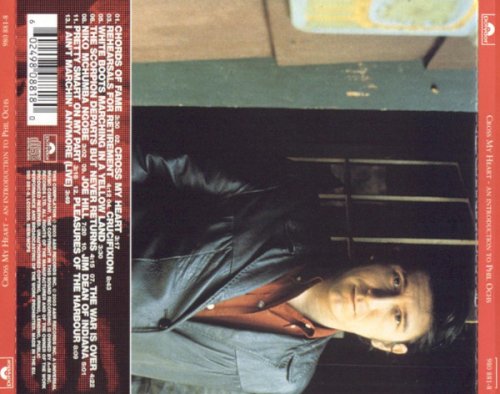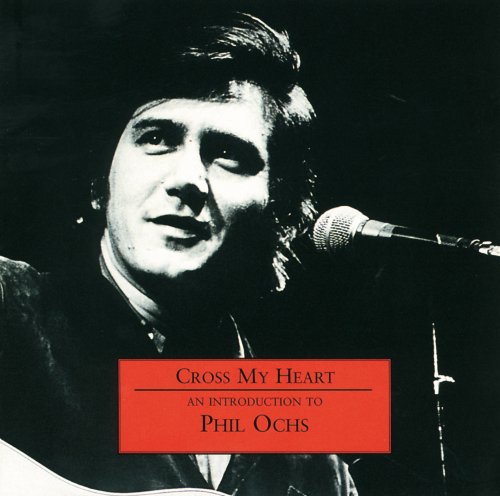
Phil Ochs - An Introduction To Phil Ochs (2003)
BAND/ARTIST: Phil Ochs
- Title: An Introduction To Phil Ochs
- Year Of Release: 2003
- Label: Polydor
- Genre: Folk Rock, Singer-Songwriter
- Quality: Mp3 320 / Flac (tracks)
- Total Time: 01:02:32
- Total Size: 153/428 Mb
- WebSite: Album Preview

Tracklist:
01. Chords Of Fame
02. Cross My Heart (Album Version)
03. Rehearsals For Retirement (Album Version)
04. The Crucifixion (Album Version)
05. White Boots Marching In A Yellow Land (Album Version)
06. The Scorpion Departs, But Never Returns (Album Version)
07. The War Is Over (Album Version)
08. Niko Mchumba Ngombe
09. Joe Hill (Album Version)
10. Jim Dean Of Indiana
11. Pretty Smart On My Part (Album Version)
12. Pleasures Of The Harbor (Album Version)
13. I Ain't Marchin' Anymore (Live)
American folk singer/songwriter who was active throughout the 60s and 70s, but committed suicide by hanging himself at his sister's home on April 9th, 1976.
Phil Ochs is a figure both glorious and tragic who haunts the history of the 1960s folk revival and its aftermath. A topical singer and songwriter in the manner of Lee Hays, Pete Seeger, and Woody Guthrie from the previous generation, he was forever in the shadow of Bob Dylan in terms of the recognition for his music; but unlike Dylan -- who, in retrospect, seemed to approach his work with overpowering facility and talent, but only occasional moments of definable dedication to the causes seemingly behind the songs -- Ochs truly believed in and embraced those causes, which may have been his tragedy.
In contrast to Dylan, who was an enigmatic media star from 1964 onward -- teasing and even daring the press and public to try and define him -- Ochs embraced the role of ideological outlaw, authoring songs that often stretched (and sometimes ripped) the envelope of acceptable popular political discourse, as well as extending the range and language of folk style music's poetry into new and gloriously rich territory. And what made it even more effective was that he did it with a voice that was so seemingly earnest and unassuming in its appeal. He may never have written anything as widely known as "Blowing in the Wind," "A Hard Rain's a-Gonna Fall," or "Mr. Tambourine Man," but he angered people across the country (and in Mississippi, for other reasons) with "Here's to the State of Mississippi"; roused those who heard them with "The Power and the Glory" (a worthy successor to Guthrie's "This Land Is Your Land") and "I'm Not Marching Anymore"; and moved many thousands to a fresh round of tears about President Kennedy with "Crucifixion." And for all of his outlaw reputation -- which began coalescing around him as early as 1965 in some "respectable," establishment circles -- his work ended up infiltrating high school classrooms through the songs "The Highwayman" and "The Bells," the latter an extraordinarily early intersection between folk song and art song. Eventually he too would follow Dylan into electric music and more personal, abstract, and romantic compositions. But Ochs had something extra, even in those years: street cred, among the people who cared -- where Dylan, due to his own calculation and the repercussions of various personal situations, spent much of the late '60s as an enigmatic recluse, respected for his identity and his songs but rather unknowable and totally remote as a presence, Ochs was in Chicago for the 1968 Democratic National Convention, when thousands of young citizens (supported by a few brave politicians) took to the streets to scream "Enough!" about the Vietnam War, and were brutally suppressed by the police under orders from the city's mayor; he even ended up as a witness at the subsequent conspiracy trial of the seven alleged conspirators behind the demonstration. And no matter how far his style advanced, and how complex his songwriting became, he never abandoned this kind of involvement with issues. Apart from American involvement in the Vietnam War, which dragged on into the mid-'70s, he saw many of the causes that he cared about move toward some measure of fulfillment as the 1970s dawned; but personal problems, including clinical depression and alcoholism, left him drained, psychologically and musically. By the middle of the decade he found there was nothing left inside, and he finally died by his own hand in 1976. It was only after his tragic tailspin and eventual death that he was properly appreciated as one of the most sincere and humane songwriters of his day, whether detailing political atrocities or more poetic concerns.
Phil Ochs is a figure both glorious and tragic who haunts the history of the 1960s folk revival and its aftermath. A topical singer and songwriter in the manner of Lee Hays, Pete Seeger, and Woody Guthrie from the previous generation, he was forever in the shadow of Bob Dylan in terms of the recognition for his music; but unlike Dylan -- who, in retrospect, seemed to approach his work with overpowering facility and talent, but only occasional moments of definable dedication to the causes seemingly behind the songs -- Ochs truly believed in and embraced those causes, which may have been his tragedy.
In contrast to Dylan, who was an enigmatic media star from 1964 onward -- teasing and even daring the press and public to try and define him -- Ochs embraced the role of ideological outlaw, authoring songs that often stretched (and sometimes ripped) the envelope of acceptable popular political discourse, as well as extending the range and language of folk style music's poetry into new and gloriously rich territory. And what made it even more effective was that he did it with a voice that was so seemingly earnest and unassuming in its appeal. He may never have written anything as widely known as "Blowing in the Wind," "A Hard Rain's a-Gonna Fall," or "Mr. Tambourine Man," but he angered people across the country (and in Mississippi, for other reasons) with "Here's to the State of Mississippi"; roused those who heard them with "The Power and the Glory" (a worthy successor to Guthrie's "This Land Is Your Land") and "I'm Not Marching Anymore"; and moved many thousands to a fresh round of tears about President Kennedy with "Crucifixion." And for all of his outlaw reputation -- which began coalescing around him as early as 1965 in some "respectable," establishment circles -- his work ended up infiltrating high school classrooms through the songs "The Highwayman" and "The Bells," the latter an extraordinarily early intersection between folk song and art song. Eventually he too would follow Dylan into electric music and more personal, abstract, and romantic compositions. But Ochs had something extra, even in those years: street cred, among the people who cared -- where Dylan, due to his own calculation and the repercussions of various personal situations, spent much of the late '60s as an enigmatic recluse, respected for his identity and his songs but rather unknowable and totally remote as a presence, Ochs was in Chicago for the 1968 Democratic National Convention, when thousands of young citizens (supported by a few brave politicians) took to the streets to scream "Enough!" about the Vietnam War, and were brutally suppressed by the police under orders from the city's mayor; he even ended up as a witness at the subsequent conspiracy trial of the seven alleged conspirators behind the demonstration. And no matter how far his style advanced, and how complex his songwriting became, he never abandoned this kind of involvement with issues. Apart from American involvement in the Vietnam War, which dragged on into the mid-'70s, he saw many of the causes that he cared about move toward some measure of fulfillment as the 1970s dawned; but personal problems, including clinical depression and alcoholism, left him drained, psychologically and musically. By the middle of the decade he found there was nothing left inside, and he finally died by his own hand in 1976. It was only after his tragic tailspin and eventual death that he was properly appreciated as one of the most sincere and humane songwriters of his day, whether detailing political atrocities or more poetic concerns.
Folk | Rock | FLAC / APE | Mp3
As a ISRA.CLOUD's PREMIUM member you will have the following benefits:
- Unlimited high speed downloads
- Download directly without waiting time
- Unlimited parallel downloads
- Support for download accelerators
- No advertising
- Resume broken downloads


